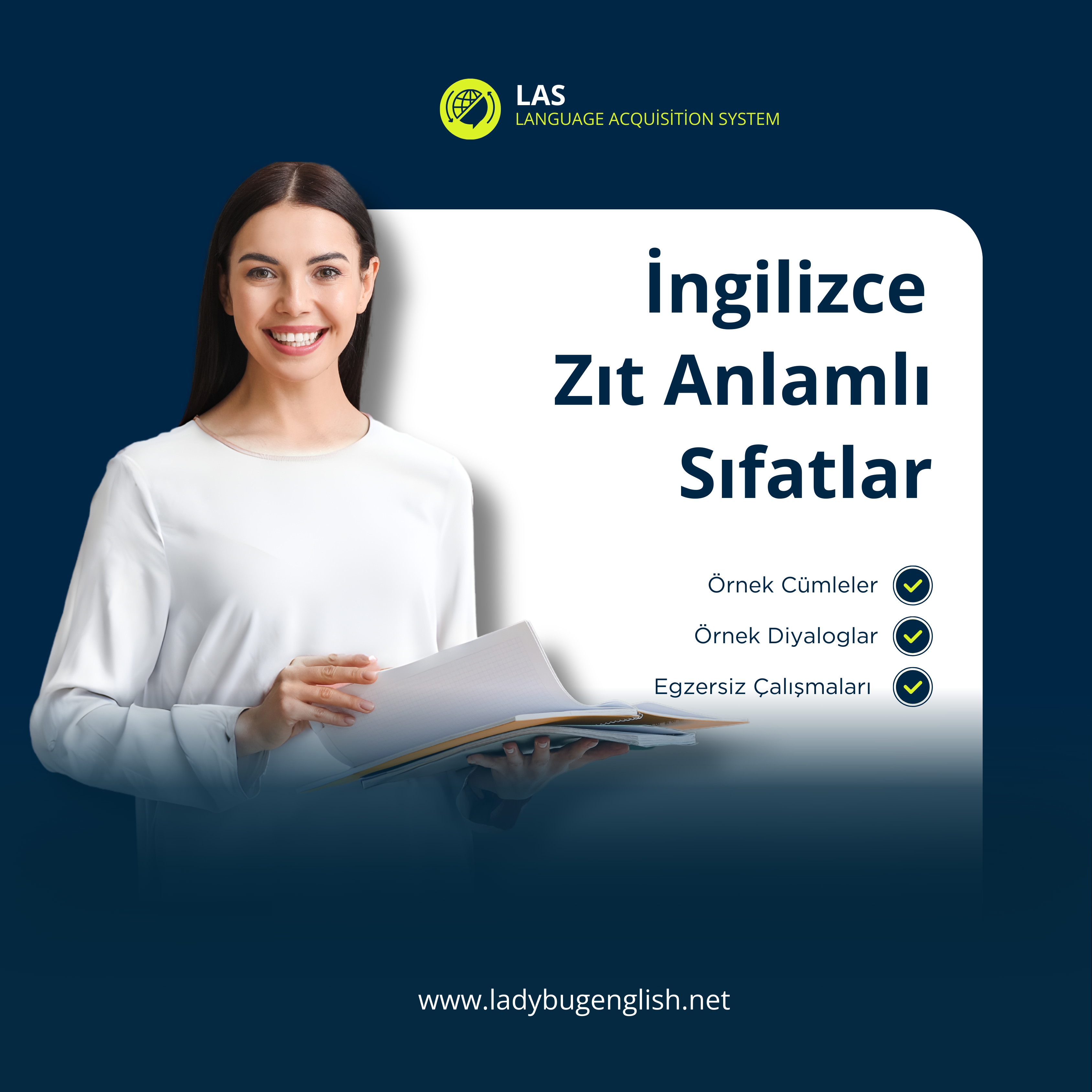İngilizce zıt anlamlı sıfatlar kelime hazinesinin hızlı bir şekilde artmasını sağlar. Çünkü bir kelimeyi onun zıt anlamı ile birlikte öğrenmek kalıcı hafızaya kaydedilmesini sağlar. Bu nedenle dil bilim uzmanları sıfatların zıt anlamları ile birlikte öğrenilmesini tavsiye etmektedir.
Bu yazımızda farklı konu başlıklarında İngilizce zıt anlamlı sıfatlar konusunu işleyeceğiz. Sıfatları verirken sadece zıt anlamını vermekle yetinmeyeceğiz ve her sıfatı örnek bir cümle içinde kullanacağız. Böylece çalışan kişinin kelimeyi bağlam içinde görmesini sağlayacağız. Yazımızın içinde ayrıca İngilizce diyaloglara, kısa metinlere ve atasözlerine de yer vereceğiz. Böylece konunun tamamen pekişmesine yardımcı olacağız.
İşte farklı başlıklarda İngilizce zıt anlamlı sıfatlar
İnsanların Dış Görünüşleri ile Alakalı Zıt Anlamlı Sıfatlar
tall (uzun boylu) – short (kısa boylu)
He is tall, but his brother is short.
O uzun boylu, ama kardeşi kısa boylu.
slim (ince) – overweight (kilolu)
She is slim, while her friend is overweight.
O ince, arkadaşı ise kilolu.
young (genç) – old (yaşlı)
My grandmother is old, but she looks young.
Büyükannem yaşlı, ama genç görünüyor.
handsome (yakışıklı) – ugly (çirkin)
He is handsome, but his friend thinks he is ugly.
O yakışıklı, ama arkadaşı onun çirkin olduğunu düşünüyor.
strong (güçlü) – weak (zayıf)
She is strong, but her younger sister is weak.
O güçlü, ama küçük kız kardeşi zayıf.
beautiful (güzel) – plain (sıradan)
She looks beautiful in that dress, while I feel plain.
O elbisede güzel görünüyor, ben ise sıradan hissediyorum.
muscular (kaslı) – scrawny (çelimsiz)
He is muscular, but his friend looks scrawny.
O kaslı, ama arkadaşı çelimsiz görünüyor.
clean (temiz) – dirty (kirli)
Her hands are clean, but her shoes are dirty.
Eller temiz, ama ayakkabıları kirli.
stylish (şık) – shabby (pejmürde)
She always dresses stylish, but her brother looks shabby.
O her zaman şık giyinir, ama kardeşi pejmürde görünüyor.
neat (düzenli) – messy (dağınık)
His room is neat, but mine is always messy.
Onun odası düzenli, ama benimki her zaman dağınık.
İnsanların Duyguları ile İlgili İngilizce Zıt Anlamlı Sıfatlar
happy (mutlu) – sad (üzgün)
She is happy today, but yesterday she was sad.
Bugün mutlu, ama dün üzgündü.
calm (sakin) – nervous (gergin)
He is calm before exams, but his friend is always nervous.
Sınavlardan önce sakin, ama arkadaşı her zaman gergin.
optimistic (iyimser) – pessimistic (kötümser)
She is optimistic about the future, while her brother is pessimistic.
O gelecekle ilgili iyimser, ama kardeşi kötümser.
brave (cesur) – fearful (korkak)
He is brave, but his little sister is fearful.
O cesur, ama küçük kız kardeşi korkak.
friendly (arkadaş canlısı) – unfriendly (soğuk)
She is friendly, but her neighbor is unfriendly.
O arkadaş canlısı, ama komşusu soğuk.
cheerful (neşeli) – gloomy (karamsar)
He is cheerful, but his friend is gloomy.
O neşeli, ama arkadaşı karamsar.
kind (nazik) – rude (kaba)
She is kind to everyone, while her brother is rude.
O herkese karşı nazik, ama kardeşi kaba.
confident (özgüvenli) – insecure (kendine güvensiz)
She is confident in her skills, but he feels insecure.
O yeteneklerine güveniyor, ama o kendine güvensiz hissediyor.
excited (heyecanlı) – bored (sıkılmış)
She is excited about the concert, but he is bored.
O konser için heyecanlı, ama o sıkılmış durumda.
grateful (minnettar) – ungrateful (nankör)
He is grateful for the help, but his friend seems ungrateful.
O yardıma minnettar, ama arkadaşı nankör gibi görünüyor.

Şekiller, Ebatlar ve Renkler ile İlgili İngilizce Zıt Anlamlı Sıfatlar
big (büyük) – small (küçük)
This box is big, but that one is small.
Bu kutu büyük, ama şu küçük.
wide (geniş) – narrow (dar)
The river is wide here, but it gets narrow upstream.
Nehir burada geniş, ama yukarıda daralıyor.
round (yuvarlak) – square (kare şeklinde)
The table is round, but the chairs are square.
Masa yuvarlak, ama sandalyeler kare.
long (uzun) – short (kısa)
She has long hair, but her sister has short hair.
O uzun saçlı, ama kardeşi kısa saçlı.
bright (parlak) – dull (mat)
The sky is bright today, but yesterday it was dull.
Gökyüzü bugün parlak, ama dün mat idi.
high (yüksek) – low (alçak)
The mountain is high, but the hills are low.
Dağ yüksek, ama tepeler alçak.
thick (kalın) – thin (ince)
The book is thick, but his notebook is thin.
Kitap kalın, ama defteri ince.
light (açık renk) – dark (koyu renk)
She prefers light colors, but he likes dark colors.
O açık renkleri tercih ediyor, ama o koyu renkleri seviyor.
heavy (ağır) – light (hafif)
This suitcase is heavy, but that one is light.
Bu bavul ağır, ama şu hafif.
tall (yüksek) – low (alçak)
The ceiling is tall, but the door is low.
Tavan yüksek, ama kapı alçak.
Sayı ve İşaret ile İlgili İngilizce Zıt Anlamlı Sıfatlar
many (çok) – few (az)
There are many people here, but few are inside.
Burada çok insan var, ama içeride az kişi var.
much (çok) – little (az)
He has much money, but she has little.
Onun çok parası var, ama onun az var.
full (dolu) – empty (boş)
The bottle is full, but the cup is empty.
Şişe dolu, ama bardak boş.
all (hepsi) – none (hiçbiri)
All students attended, but none left early.
Bütün öğrenciler katıldı, ama hiçbiri erken çıkmadı.
some (birkaç) – no (hiç)
Some students were absent, but no teachers were.
Birkaç öğrenci yoktu, ama öğretmenler yoktu.
numerous (çok sayıda) – scarce (kıt)
Resources are numerous here, but scarce in other areas.
Burada kaynaklar bol, ama diğer bölgelerde kıt.
double (çift) – single (tek)
He ordered a double bed, but they gave him a single one.
Çift kişilik yatak sipariş etti, ama ona tek kişilik verdiler.
first (birinci) – last (son)
She was the first in line, but he was the last.
O sıranın birincisiydi, ama o sonuncuydu.
open (açık) – closed (kapalı)
The store is open now, but it will be closed soon.
Dükkan şu an açık, ama yakında kapanacak.
many (birçok) – few (birkaç)
Many people came, but only a few stayed.
Birçok insan geldi, ama sadece birkaçı kaldı.
Günlük Yaşamla İlgili İngilizce Zıt Anlamlı Sıfatlar
easy (kolay) – hard (zor)
The task is easy, but the test was hard.
Görev kolay, ama sınav zordu.
expensive (pahalı) – cheap (ucuz)
That restaurant is expensive, but this one is cheap.
Şu restoran pahalı, ama bu ucuz.
fast (hızlı) – slow (yavaş)
She is a fast runner, but her friend is slow.
O hızlı koşar, ama arkadaşı yavaş.
clean (temiz) – dirty (kirli)
His room is clean, but the kitchen is dirty.
Odası temiz, ama mutfak kirli.
modern (modern) – traditional (geleneksel)
Their house is modern, but her grandmother’s is traditional.
Onların evi modern, ama büyükannesinin evi geleneksel.
strong (güçlü) – weak (zayıf)
He feels strong today, but yesterday he was weak.
Bugün güçlü hissediyor, ama dün zayıftı.
hot (sıcak) – cold (soğuk)
The coffee is hot, but the water is cold.
Kahve sıcak, ama su soğuk.
busy (meşgul) – free (boş)
She is busy now, but will be free later.
Şimdi meşgul, ama sonra boş olacak.
safe (güvenli) – dangerous (tehlikeli)
This area is safe, but that one is dangerous.
Bu alan güvenli, ama orası tehlikeli.
useful (yararlı) – useless (yararsız)
The book is useful, but the notes are useless.
Kitap yararlı, ama notlar yararsız.
İngilizce zıt anlamlı sıfatlara yer veren örnek bir diyalog
Anna: Hey, John! How was your weekend?
John: It was great! I went on a trip to the mountains. The weather was so cold up there, but the view was absolutely beautiful.
Anna: That sounds amazing! Was the hike tough?
John: It was a bit hard at times, but I enjoyed it. On the other hand, the beach trip I took last month was so easy and hot!
Anna: I can imagine! Do you prefer the calm atmosphere of the beach, or do you like the busy vibe of the mountains?
John: Both have their charm, but I think I enjoy the calm atmosphere more. It’s so relaxing compared to the busy mountain trails.
Bu diyalogda zıt anlamlı sıfatlar şu şekilde kullanılmıştır:
Cold (soğuk) / Hot (sıcak)
Beautiful (güzel) / Ugly (çirkin)
Hard (zor) / Easy (kolay)
Calm (sakin) / Busy (yoğun)
Türkçe çevirisi
Anna: Hey, John! Hafta sonun nasıldı?
John: Harikaydı! Dağlara bir geziye gittim. Hava orada çok soğuktu, ama manzara gerçekten güzeldi.
Anna: Kulağa harika geliyor! Yürüyüş zor muydu?
John: Bazen biraz zordu, ama keyif aldım. Öte yandan, geçen ay yaptığım sahil gezisi çok kolay ve sıcaktı!
Anna: Tahmin edebiliyorum! Sakin bir sahil atmosferini mi yoksa dağların yoğun havasını mı tercih edersin?
John: İkisinin de ayrı bir çekiciliği var, ama sanırım sakin atmosferi daha çok seviyorum. Dağlardaki yoğun patikalara göre çok daha dinlendirici.
İngilizce zıt anlamlı sıfatlara yer veren örnek bir metin
Emma had always dreamed of living in a quiet neighborhood, far from the noisy city. When she finally found a small house with a big garden, she was overjoyed. The house was old, but it had a modern charm, with bright colors that made it feel cheerful even on dark days.
Her daily routine changed completely. Instead of rushing through busy streets, she enjoyed peaceful walks surrounded by clean air and fresh trees. She felt happy in her new home, a huge contrast to the unhappy and stressful life she had left behind in the city.
One day, Emma invited her friend Sarah over. Sarah, who loved crowded places, found the area too empty and quiet. She thought the house was simple, but Emma found it beautifully unique. Despite their different tastes, they both agreed that Emma had made a good choice for herself.
Bu metinde kullanılan zıt anlamlı sıfatlar şunlardır:
Quiet (sakin) / Noisy (gürültülü)
Small (küçük) / Big (büyük)
Old (eski) / Modern (modern)
Bright (parlak) / Dark (karanlık)
Busy (yoğun) / Peaceful (huzurlu)
Clean (temiz) / Dirty (kirli)
Happy (mutlu) / Unhappy (mutsuz)
Crowded (kalabalık) / Empty (boş)
Simple (sade) / Unique (benzersiz)
Different (farklı) / Same (aynı)
Good (iyi) / Bad (kötü)
Metnin Türkçe çevirisi
Emma, sessiz bir mahallede, gürültülü şehirden uzakta yaşamayı hep hayal etmişti. Nihayet büyük bir bahçesi olan küçük bir ev bulduğunda çok mutlu oldu. Ev eskiydi, ama modern bir cazibesi vardı; parlak renkleri sayesinde karanlık günlerde bile neşeli hissediliyordu.
Günlük rutini tamamen değişmişti. Yoğun sokaklarda koşturmak yerine, temiz hava ve taze ağaçlarla çevrili huzurlu yürüyüşlerin tadını çıkarıyordu. Yeni evinde mutluydu, şehirde bıraktığı mutsuz ve stresli hayatın tam tersiydi.
Bir gün, Emma arkadaşı Sarah’ı davet etti. Kalabalık yerleri seven Sarah, bu bölgeyi çok boş ve sessiz buldu. Evi sade olarak nitelendirdi, fakat Emma ona göre evi güzel bir şekilde benzersiz buluyordu. Farklı zevklerine rağmen, ikisi de Emma’nın kendisi için iyi bir seçim yaptığı konusunda hemfikirdi.
İngilizce zıt anlamlı sıfatlar ile ilgili egzersiz çalışması
Aşağıdaki cümlelerde boşlukları zıt anlamlı sıfatlarla doldurun.
The box was surprisingly heavy, but the bag next to it was very __________.
My new neighborhood is really quiet, unlike the __________ city center where I used to live.
Sarah likes bright colors in her room, but her brother prefers __________ shades.
We visited an old village in Italy, which was a nice change from the __________ buildings in the city.
It was so hot yesterday, but today the weather is quite __________ and refreshing.
The movie we watched was really boring, but the one last week was __________ and exciting.
I love the fresh air in the countryside, but in the city, it always feels __________.
The test was surprisingly difficult, and not as __________ as we expected.
Tom lives in a small apartment, while his friend has a __________ house in the suburbs.
Her voice is usually soft, but when she’s angry, it becomes quite __________.
Cevap Anahtarı
light
noisy
dark
modern
cold
interesting
dirty
easy
big
loud

